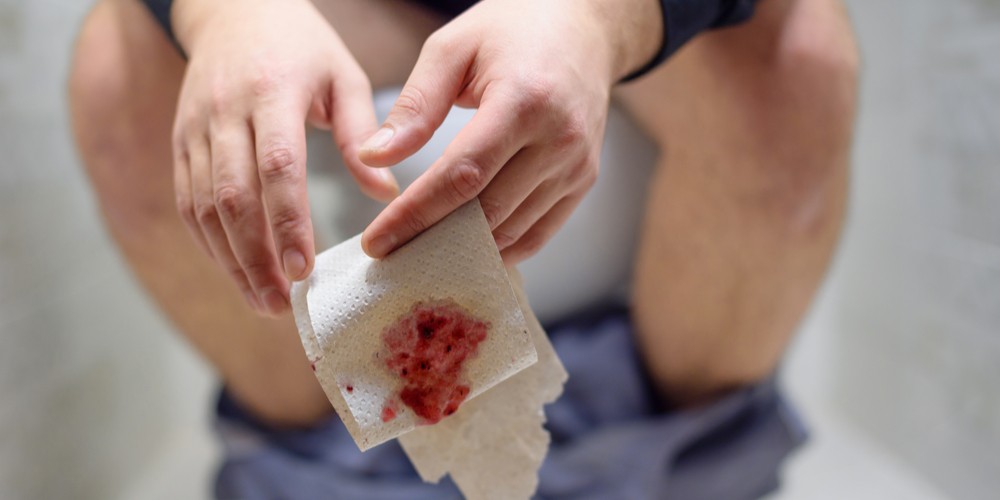![]() Views: 152,591
Views: 152,591
Why is There Blood in Your Stool?
Dedicated Support at Every Step!
Our Doctors are available 24 hours a day, 7 days a week to help you!
Blood in stool is not common. If you ever happen to see blood in your stool or experience intense pain while passing bowels, it is not normal and should not be avoided. There can be several reasons for blood in the stool. Sometimes, it could be normal and other times, it might need professional help.
Blood in the stool can be caused due to constipation, anal diseases, anal cancer, colon cancer, irritation in the anus, hemorrhoids, etc. Whatever the reason may be, we recommend you consult the doctor.
Ignoring blood in the stool can worsen the condition. The condition of blood in the stool is also called rectal bleeding.
In some cases, the stool may also appear to be black, dark brown, or tar-like in color.
15 reasons for blood in stool:
Rectal Bleeding or Hematochezia is a condition in which the patient releases blood in the stool. Rectal bleeding can also be a symptom of some serious diseases.
Here are some common reasons behind blood in the stool.
- Anal Fissure: An anal fissure is a small cut or tear in the mucosal lining of the anus. It leads to painful bowel passage and blood in the stool.
- Piles or Hemorrhoids: It is a condition where blood vessels, tissues, and muscles in the anal area are swollen and inflamed. It occurs due to prolonged hours of sitting and straining during passing stools. on hard chairs. This causes pain and itching in and around the anus. (Also read: Know Everything about Piles treatment)
- Diverticulosis: It is a condition in which small pouches or diverticula have formed around the walls of the large intestine that causes bleeding. This blood further passes out of the body with stool.
- Polyps: Polyps are small growth of excess tissues on the lining of the large intestine. Very rarely, they can turn cancerous. Because of polyps, one may pass blackish-red stools.
- Colon Cancer: Colon cancer is a rare type of cancer that initially starts in the large intestine. Common symptoms of colon cancer include blood in the stool, fatigue, weight loss, constipation or diarrhea, dark or black colored stool, etc.
- Food Poisoning: When you eat stale food or drink contaminated water, you may get food poisoning. These food-borne bacteria can cause blood in the stool. Get your stool sample tested to know the type of bacteria you are exposed to.
- IBD [Inflammatory Bowel Disease]: Another problem that can cause blood in stool is IBD. It is inflammation in the bowels. People with IBD can suffer from symptoms like diarrhea [ffected parts of the bowel can't reabsorb water], blood in stools [due to ulcers], stomach pain, cramping, and bloating [due to bowel obstruction].
- Crohn's disease: It is one of the most common types of IBD. Crohn’s disease causes inflammation of the digestive tract lining and can lead to severe diarrhea and abdominal pain. The inflammation can lead to blood in the stool.
- Gastroenteritis: Gastroenteritis is a common bacterial infection that causes diarrhea and vomiting. The tummy bug affects people of all ages but is most common in young children. The illness can cause inflammation in the stomach and colon, making it more sensitive when doing a poo. This can cause spots of blood to appear in your stools.
- Peptic Ulcers: A peptic ulcer is an open sore in the lining of the stomach, the upper end of the small intestine, or the duodenum caused by a bacterial infection.
- Internal bleeding: If the blood in the stool is dark red, it can be a sign of internal bleeding. It could happen anywhere in your digestive system, from your stomach to your small and large intestines. Such bleeding can be a sign of cancer, stomach ulcers, or severe gastrointestinal disease. Consult a doctor if you notice dark red color blood in the stool.
- Colitis: Colitis is a long-term condition in which the rectum and colon get inflamed. Small ulcers develop in the lining of the bowel. These ulcers bleed and also get pus. People with colitis are also more likely to suffer other bowel conditions such as IBS (Irritable bowel syndrome) and Crohn's disease.
- STIs [Sexually Transmitted Infections]: STIs can affect the bottom as well as the penis and vagina. Unprotected anal sex can spread STIs from person to person. Once infected, it can cause inflammation of the lining of the anus, which can lead to bleeding and pus. You will need to see a doctor for diagnosing the infection, after which you will be treated with either antibiotic, antiviral or antifungal medication depending on the type of infection you have.
- Prolapse: This can be something very serious when there is rectum prolapse. Prolapse means part of your rectum will protrude out through your bum. It can happen when while passing stool and can be quite discomforting. You may not be able to control your bowel if you have a prolapse. You may notice pain and blood in the stool. Immediate medical intervention is important so contact a doctor as it will not heal on its own.
- False Alarm: Sometimes, coloring from the food we eat like beetroot or red gelatin can turn your stool red. (Also read: Anatomy of colon and rectum)
The exact reason for the presence of blood in piles cannot be guessed verbally. The patient needs to be thoroughly examined by a professional medical adviser or a doctor in order to find out the exact reason behind it.
No Cost EMI, Hassle-free Insurance Approval
How to stop blood in stool?
To stop rectal bleeding or blood in the stool, you can follow these simple practices:
- Drink 5-6 glasses of water per day.
- Do not strain while passing stools.
- Clean your anal area every time you poo.
- Add more fiber foods to the diet.
- Avoid sitting in the toilet seat for too long.
How to Treat Blood in the Stool?
Rectal bleeding is prevalent among the majority of humans today. In most cases, rectal bleeding is just a symptom of some other disease such as piles, anal fistula, colon cancer, etc. And hence, to treat blood in the stool, one needs to treat the disease that causes bleeding while passing stools or leakage of blood with blood.
It is strictly advised to the patients not to self-diagnose the condition that is causing blood in stools. Self-diagnosis can make the condition severe and can lead to life-threatening conditions. So, it is always recommended to consult an expert doctor like proctologists, anorectal surgeons, and colorectal surgeons for proper diagnosis and the best suitable treatment.
Most of the patients who visit us for treatment regarding blood in stool are diagnosed with either piles or fissures or fistula. And all our expert doctors [proctologists and anorectal surgeons] perform laser surgeries to treat and cure those diseases that cause blood in stools.
Laser surgery treatment provides a permanent cure for piles and other anorectal diseases. The patient feels minimal pain during the surgery and after sufficient bed rest, he/ she can resume their normal daily routine. Even the chances of complications are negligible.
If rectal bleeding is very minimal, it can be treated using home remedies. But, if the condition prevails for a long time, seeking medical help from an expert proctologist is extremely important.
Also Read: When Piles Need Surgery
Also Read: Yoga Poses & Exercises to Cure Piles
FAQs
Blood in stools may or may not be a sign of bowel cancer. Consult a general physician if you are worried about the symptoms. Usually, blood in stools can be because of piles or fissure.
Blood in stool can be harmless, it can be discomforting in case of piles, fissure, straining during bowel movements or can be a serious problem of bowel cancer.
The primary symptoms of colon cancer are: - constipation, diarrhea, changes in bowel habits, rectal bleeding or blood in the stool, abdominal bloating, cramps or discomfort, and a feeling that the bowel doesn't empty completely.
Blood in the stool can be due to long-term constipation or diarrhea. Straining during a bowel movement may cause blood in the stool. Dehydration or low fiber intake can cause constipation. So, yes, dehydration may cause blood in the stool.










